In this interview, you’ll meet best-selling author and screenwriter Dougie Brimson and discover how he got started and what inspired him to write his critically acclaimed screenplays and books.
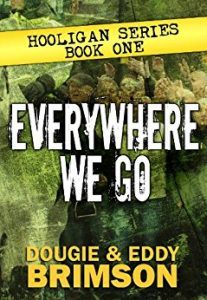
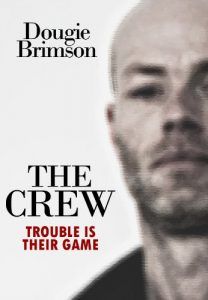
Perhaps best known for penning the multi-award winning feature Green Street, Dougie Brimson’s writing career began in 1996 when, after 18 years service with the Royal Air Force, he co-authored the best-selling non-fiction soccer book, Everywhere We Go.
Everywhere We Go is a groundbreaking insider’s account of British football violence which remains an era-defining bestseller till today.
The Daily Mail described the book as “Probably the best book ever written on football violence”.
A further 14 titles have followed in a variety of genre including the crime thriller, The Crew – which has topped the Amazon sports book download charts for over five years – and the comedies Billy’s Log and Wings of a Sparrow. Total worldwide sales of his various titles now exceed 750,000 copies.
In 2003, Dougie made the move into the world of screenwriting first with the critically acclaimed short movie It’s a Casual Life and then with his first full-length feature, Green Street.
May 2014 saw the release of his second feature, an adaptation of his own novel Top Dog which took the Best Feature award at the British Independent Film Festival. A third feature, the urban revenge thriller We Still Kill The Old Way was released to public and critical acclaim in December 2014.
Since 2015 Dougie has primarily concentrated on developing film projects but will shortly return to the world of print with two new novels.
Visit Brimson’s website to learn more about his work and read his books on Amazon.
Trailer of We Still Kill the Old Way
Interview with Dougie Brimson
Q: What is your latest screenplay Boots on the Ground about?
Boots on the Ground is a film about the struggle faced by disabled veterans as they try to return to the normality of civilian life after combat.
Q: How did you become involved with this subject?
After three features and 15 books, I was constantly being asked why I’d never written anything about the military given that I’d spent 18 years in uniform.
The truth was that I’d never really found a story which I felt confident enough to tackle but then I read this short piece about a guy who had lost both his legs in combat and was struggling to come to terms with it.
That got me thinking about all kinds of things associated with what we would consider normal life and how we expect these guys to simply return from combat and slot straight in as if nothing had changed for them.
But equally, I was fascinated by the impact on their families and the more I thought about it, the more determined I became to tell that story.
From that point on, it kind of wrote itself and is by some distance, the best thing I have ever written.
Q: What was the hardest part of writing Boots on the Ground?
Capturing the emotional journey the central character has to go through. From the highs of combat to the lows of suicide, he experiences everything life could possibly throw at him and more.
For someone like me who stepping miles out of his comfort zone with this project, that was incredibly difficult yet I somehow pulled it off.
Q: What did you enjoy most about writing this script?
The best thing was stepping back into a military mindset. This was especially true when writing the banter which takes place between the lads in hospital.
No one does dark humour quite like the military and writing that was a joy.
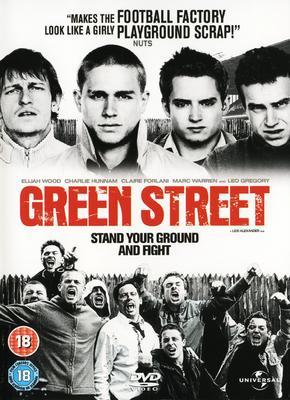
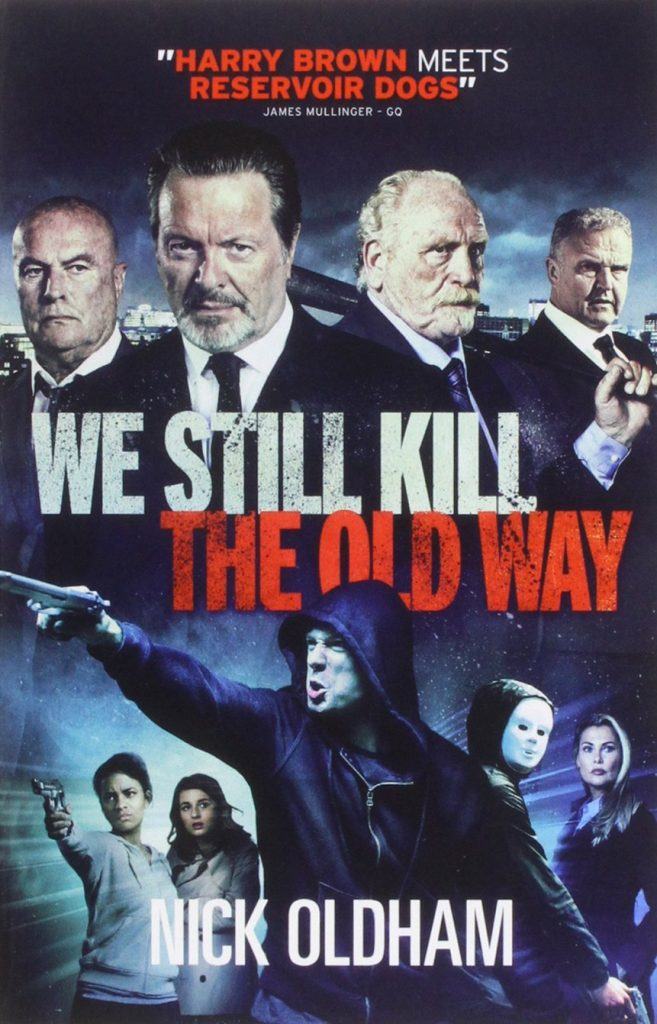
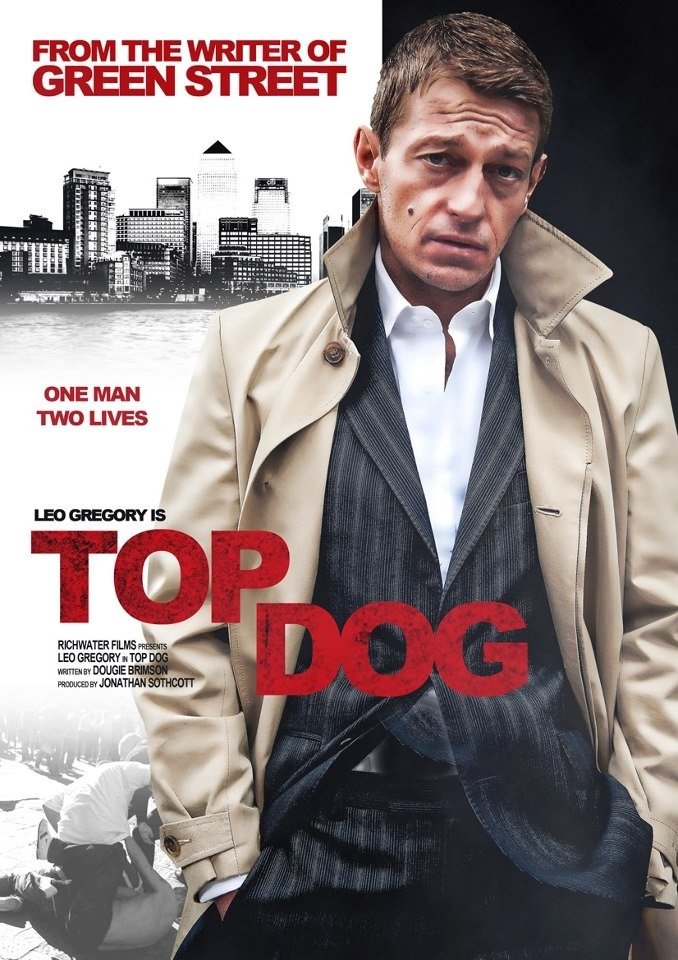
Q: Has your screenplay Boots on the Ground been produced or optioned yet?
Despite lots of great feedback from script readers and interest from both studio’s and TV companies here in the UK, we are yet to receive an offer for the option.
Quite why that is remains a mystery but we’ll persevere with it. It’s too good a story to let go of.
Q: Tell us about the characters in your stories.
All of my characters, be they on screen or in print, are based on people I know and most of the situations I use have a basis of something that’s happened to me or a friend in real life.
In Boots on the Ground, for example, there is a scene where the central character is taken on a drunken night out by his mates. However, as he has no legs they end up pushing him from bar to bar in a shopping cart and eventually, through a McDonalds drive-thru. I once did that.
Q: What’s the strangest thing you have ever had to research online or do for your work?
As both an author and a screenwriter, I’ve written about more bizarre subjects than I care to think about.
However, in terms of weird, I have to say that researching the subject of flatulence for a comedy book I wrote called The Art of Fart was certainly up there with the weirdest.
Q: As a child, what did you want to do when you grew up?
My father was an entertainer but I had no interest in following in his footsteps. Instead, I wanted to be an engineer which was exactly what I became in the military.
Q: At what age did you start writing?
I’d never written anything much until my first book was published in 1996.
Q: What was your first writing experience like?
It was actually quite natural. It was a non-fiction book about a subject I’d been immersed in for over 20 years and so I had little or no research to do but knew exactly what I wanted to say.
As a consequence, the words just fell out of me.
Q: How did you launch your career?
It’s important to note here that I never set out to be a writer but I fell into it by accident. I’d left the RAF in 1994 with no real idea of what I wanted to do other than I was intent on avoiding any more engineering for a while and so ended up working as a TV and Film extra with my younger brother.
Anyone who has ever done any of that kind of work knows how much sitting around you do and inevitably, discussions turned to soccer and the subject of hooliganism. That’s when the idea for my first book, Everywhere We Go, was born.
Working with my younger brother, we gathered a pile of ideas and notes together until we eventually decided that we best approach a publisher. So I walked into a local book store, picked up the first soccer book I came across and wrote to the publisher. I wouldn’t say they bit our hands off, but within a few weeks we had a deal and an advance. It was only years later that I discovered how lucky we’d been and that it doesn’t happen like that for everyone!
We wrote a few books after that and then I was approached by a director called Jon S. Baird (who went on to direct Filth by Irvine Welsh) with the idea of writing a short movie. As someone who loves a challenge, I started working on that and then I discovered someone who was looking to do a feature based on a soccer hooligan. That was how Green Street came about.
Q: What was the biggest obstacle you’ve had to overcome?
In terms of the film business, it’s definitely ageism. To an extent, I can understand that. After all, I’m 58, so why would an exec want to deal with someone who is probably old enough to be their father? But it is incredibly frustrating.
From a more personal perspective, as someone who is naturally lazy and will do anything to avoid actual work, forcing myself to sit at a computer every day is an ongoing battle. One I don’t always win!
Q: What keeps you going?
Despite stepping into the screenwriting world quite late in life, I’ve achieved more than I ever thought I would and so I don’t have that drive which most writers seem to have. However, I do have two scripts that I would like to see make it to the screen and that can only happen if I keep working.
One is Boots on the Ground and the other is a comedy called Wings of a Sparrow which is an adaptation of one of my novels.
If and when they make it, I’ll quit.
Q: How has your family, upbringing, and environment influenced your writing?
My father was a story-teller and I seem to have inherited that quality from him.
Aside from that, God only knows how I ended up doing this although a desire to feed my family and buy motorcycles certainly helped!
Q: Tell us about your career.
I’ve been a pro-writer for over 20 years now although I primarily consider myself to be an author as opposed to a screenwriter. I’ve been a pro-writer for over 20 years now although I primarily consider myself to be an author as opposed to a screenwriter.
It is however, safe to say that I am far from a typical writer. It might be my job, but I certainly don’t treat it as such. Writing for me, has to be fun because if I’m not enjoying writing something, how on earth is someone going to enjoy reading it?
For that reason, I will only ever take on a project which excites me enough to WANT to work on it.
That said, if someone brings me something with someone attached who I would like to work with, I’ll certainly take a long hard look.
I’ve been lucky enough to work with some fabulous people in the past including Elijah Wood, Charlie Hunnam, Leo Gregory and Martin Kemp of Spandau Ballet fame and had great fun with them all.
Q: What genres do you write in?
I’m not a fan of tagging myself in a specific genre as I find it limits my marketability as a writer. However, it’s safe to say that I write movies (and books) which are targeted directly at working class males.
Q: What inspires you to write?
I’m not sure inspires is the right word for me, I tend to think that things motivate me. And key to that are endings.
I love a good ending and indeed, no matter what the project I will always write the ending first. Only when I’m 90% happy with that will I move to page one.
Q: What do you consider your best accomplishment?
Well since it was a global hit and is still shown regularly on TV, there’s no doubt that Green Street has to take that title.
Q: What was the most amazing moment of your career?
There have been many moments that would fit that bill from sitting on a train opposite someone who was reading one of my novels to receiving news that Elijah Wood had agreed to take on the lead for Green Street.
But the most amazing moment came during the filming of Top Dog which I had adapted from my own novel.
We were filming a particularly intense scene involving two of the central characters and the actors (Vincent Reagan and Ricky Harnett) performed it exactly as I had imagined it in my head. And I mean, exactly.
It was so incredibly emotional that I had to walk out.
Q: What are your current and upcoming projects?
Screen projects I have in development at the moment are:
Three Greens (thriller – feature) currently being cast.
Boots on the Ground (drama – feature)
Wings of a Sparrow (comedy – feature)
First Parallel (supernatural thriller – returnable TV)
I also have two novels in work, both sequels.
Q: Do you ever suffer writer’s block?
I don’t believe in writer’s block, I never have. To me, it’s a catch-all phrase used to excuse laziness or a refusal to accept that either something isn’t working or you’ve run out of ideas.
That’s not to say I don’t get stuck, because I do. But in those instances, I clear my head either by going for a ride on a motorcycle or switching to writing something else. Indeed, I always have two projects on the go for that very reason.
Q: What is your process of writing a story?
I’m very much a seat-of-the-pants style writer and so, as long as I have the basics and a strong ending in place, I’m happy to thrash through a first draft to see how it begins to unfold.
However, prior to starting the actual process of writing I will begin to create my characters by giving them a face, a name and a voice. Once I have those, I have enough to work with and will put extra flesh on them as I’m writing the first draft.
Q: What’s your favorite environment for creativity and productivity?
I have an office in my house but for the most part, I will write at a table in my dining room much to the annoyance of my wife. I have an office in my house but for the most part, I will write at a table in my dining room much to the annoyance of my wife.
I tend to edit on my sofa with the TV on or in a local coffee house which is also where I also find a lot of inspiration.
Q: What is your work schedule when writing?
Unless there’s a deadline involved, if I’m in the mood, I write. If I’m not, I won’t. Simple.
Q: Do you have any quirky writing habbits?
Aside from writing endings first, unlike many writers I can only work properly if there’s noise. As a result I’ll usually work wearing headphones with something suitable playing at a volume which my wife will always tell me is far too loud.
Q: Do you have an agent?
I worked without an agent for years but having been caught out signing a deal which basically ripped me off, I decided that I had to find representation if only to protect myself.
However, after years promoting my books and securing my own deals, leaving that side of the business to someone else is incredibly difficult especially during those periods when nothing seems to be happening.
What makes it worse for me is that I am not a natural networker. I find that side of things incredibly difficult as I’m actually quite shy and ironically, dislike talking about myself and my work.
Q: How did you obtain your agent?
I’m currently represented by SMA Talent in London who I contacted after they liked me on Twitter. They asked to meet me and it went from there. I’ve been with them for about two years now and they’ve been great to work with.
However, before that I must have contacted lots of agents but despite my track record, I didn’t receive a single reply let alone an offer to meet.
I leave all of my screen work to SMA but continue to handle the book side of my work myself. That however, may change in the very near future.
Q: Have you been interviewed or featured in any publications?
I write a lot about the subject of soccer hooliganism and so have been interviewed by hundreds of publications over the years. It’s a great way of selling books!
Q: Have you won any awards?
My movies have all won awards at various festivals but personally, I’ve never won a thing.
Q: How do you promote and market your work?
My primary promotional vehicle these days is social media. I use both twitter and Facebook constantly. I also have a lengthy backlist so reputation and word of mouth also seem to work well.
I’m also a regular public speaker at writing groups and motivational conferences which is something I quite enjoy
Q: What is your advice to aspiring writers?
The most important piece of advice I would give to any aspiring writer is that if you can’t handle criticism or rejection, don’t do it. Period.
After that, always keep in mind that whatever you write, be it book or film, absolutely everything revolves around the core story. So make sure that you have that tight from the outset and you can’t go far wrong.
Personally, I have never taken a single writing course but I’d advise anyone looking to start to join a local writing group. They are awesome places.
And if you want to take a course, make sure that you check out who’s teaching you. Why would you listen to anyone who has no track record of actually doing it?
Q: What are you good at asides from writing?
I’m not sure I’m actually good at anything although I have recently discovered a love of cooking and so enjoy that as a bit of escapism.
Q: What do you like to do when you’re not writing?
Sadly, thanks to a broken back during my military days which has now come back to haunt me, I have been forced to curtail my motorcycling activities. However, I’m a huge sports fan so weekends are usually taken up watching either soccer or some form of motorsports.
Q: What are your favorite movies/TV series/theater plays? What writers do you admire?
Like many movie fans I have a list of films which no matter when they are shown on TV, I will simply have to stop and watch. These range from Singing In The Rain to The Lord of the Rings trilogy.
I’ve also recently discovered a TV channel here in the UK which shows only old classic black and white movies so am in my element watching some of the gems which turn up on that.
In terms of actual TV, I’m actually quite fussy about what I watch however, despite the fact that I’m not a fan of horror (or anything that will scare me!) I loved Stranger Things. I also think The Good Wife is one of the all-time classic TV series.
Theatre wise, I rarely go to watch plays but I do love a good musical. I must have seen Chicago seven or eight times now.
Q: If you were deserted on an island, which three people would you want to have with you and why?
Since most of the lead characters in my books are based loosely on either myself or a friend, meeting them in real life is pretty normal for me! Since most of the lead characters in my books are based loosely on either myself or a friend, meeting them in real life is pretty normal for me!
However, in my novel Top Dog I created a character called Fitch who I’d like to meet one day. I like him a lot (although I’ve actually just killed him off in a novel I’m working on!)
Q: What would you do if you weren’t a writer?
If I wasn’t a writer, then I’d love to have worked in motorsport. Either that, or I’d have gone back into the military.
Q: What are your big dreams and goals?
At the moment, other than taking Boots on the Ground to the screen, I want to see a new book on the shelves of my local bookstore.
Once I’ve done those two, I’ll be a happy and contented man.
Q: What do you love most about a writer’s lifestyle?
There’s a writers lifestyle? God only knows what that is!
For me, the best thing about being a writer is the response from readers (or viewers). Ultimately, if people didn’t read or watch films, I wouldn’t have a career and so when they write to thank you, or tell you that your books helped get them into reading or even helped them deal with a spell in prison, you know that you are doing something right.
It doesn’t get any better than that for me.
The best thing about being a writer is the impact my work has had on people.
I don’t mean that in any grandiose sense but when you receive a letter from someone who tells you that mine are the only books her husband has ever read or that I helped them pass the time in prison…
Freedom. Not just to create whatever I want to create, but to do that work whenever and wherever.
Thank you, Dougie Brimson, for taking part in our interview!
Trailer of Top Dog
Trailer of Green Street
You can watch an interview Dougie had with Breaking Legs here, read his interview with EyePlug here, and his interview with Of Pitch and Page here.
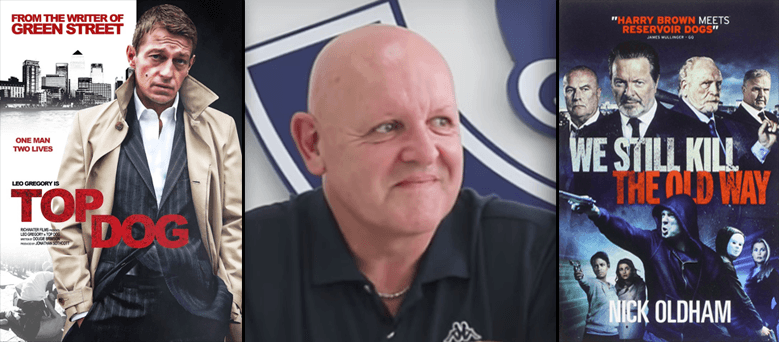

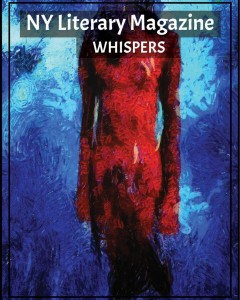

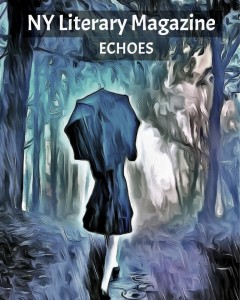
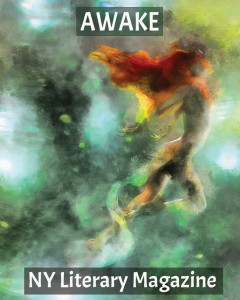
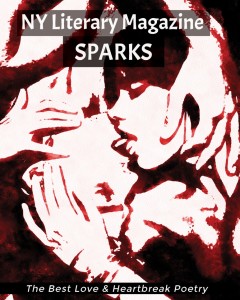
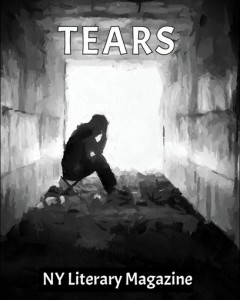
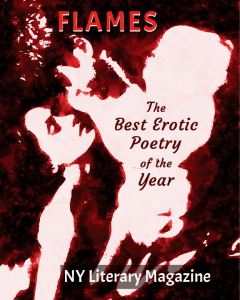


Leave a Reply
You must be logged in to post a comment.